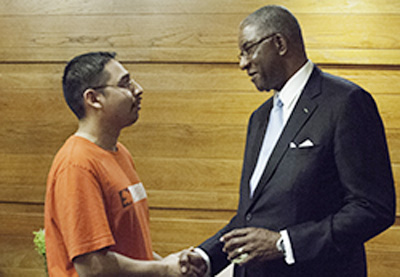By Ken Camp
Real repentance leading to racial reconciliation demands restitution for victims of oppression and injustice, Wendell Griffen told a Hardin-Simmons University audience March 23.
“The work of healing what has been wounded, righting what has been wronged and restoring what has been stolen or destroyed requires doing justice and the ethics of restitution, reparation, restoration and reconciliation,” said Griffen, pastor of New Millennium Church, a Cooperative Baptist Fellowship congregation in Little Rock, Ark.
“Until we do these things, we have not engaged in biblical repentance, no matter what else we may have accomplished.”
Griffen delivered the 15th annual T.B. Maston Lectures in Christian Ethics on Hardin-Simmons’ Abilene, Texas, campus. It was sponsored by Hardin-Simmons University’s Logsdon Seminary. The school sponsors the lectures in conjunction with the T.B. Maston Foundation to honor the legacy of Maston, a pioneering 20th-century ethics professor at Southwestern Baptist Theological Seminary in Fort Worth, Texas.
Jesus, in line with the Old Testament prophets before him, taught repentance involved “rejecting idolatry of self and turning to — embracing — God and God’s vision about how we relate to God and others,” Griffen said.
Repentance ‘not optional’
“Repentance for Jesus and the Hebrew prophets is not optional, morally or ethically,” he continued.
For Jesus and the Hebrew prophets, repentance was an ethical imperative.
“Through repentance, we are impelled to turn from the ethics of chaos, estrangement and self-righteousness and embrace reconciliation and community.”

Traditionally, Baptists have stressed repentance as an act of personal piety, but biblical repentance includes an ethical imperative to seek social justice, Griffen said.
Repentance grows out of a prophetic challenge. Prophets see unjust situations from God’s perspective, and then God commissions them to inspire others to see the “subversive” vision of divine love, truth and justice, he said.
“The prophetic call to repentance is always an act of protest. It is an observation and an objection that the way we live violates the Great Commandment that we love God with our whole being and love others as ourselves,” he said.
Protesting violations of love, truth, justice
God initiates the prophetic vision and the challenge that follows, he said. The call to repentance involves a call to join God in protesting violations of love, truth and justice.
“We never become repentant people without somehow becoming prophetic people.”
Repentance means more than acknowledging guilt and offering apologies; repentance requires action to repair the harm caused by wrongdoing, he said.
The resolution on racial reconciliation the Southern Baptist Convention approved at its 1995 annual meeting in Atlanta falls short of biblical repentance, Griffen said.
The resolution rightly acknowledged the convention’s historic origins in support for slavery and confessed the involvement of many Southern Baptists in supporting systemic segregation and institutional racism, he said.
SBC omitted call for restitution
However, it failed to include any substantive call for restitution and reparation to victims of racism and discrimination, he added.
“No commitment is affirmed — let alone pledged — to do the healing work of justice for people whose ancestors were enslaved, dehumanized, defrauded, terrorized and marginalized and who continue to suffer from that colossal violation of divine love, truth and justice,” he said.
If Baptists and other Christians are serious about racial reconciliation, they must not merely apologize for past injustice but seek to correct its consequences through meaningful restitution, Griffen said.
“Repentance, like grace, is costly, not cheap.”
Citing Martin Luther King Jr.’s call for “a radical revolution of values,” Griffen challenged Baptists in the 21st century to re-imagine and embrace what he called “the subversive gospel of Jesus Christ” and confront racism, materialism and militarism, as well as sexism, classism and techno-centrism.
“The painful truth is that political, commercial and even religious leaders are comfortable now bestowing platitudes on Dr. King’s life and ministry while actively and deliberately disregarding his warnings and call for repentance,” he said.
‘Re-assassinating’ MLK
“Our leaders play on — some would say pimp — Dr. King’s moral authority for their own benefit at every opportunity,” he said” “However, they question the relevancy of his teachings and his warnings for our time.”
In the process, he said, they “re-assassinate” King by claiming to venerate his memory while rejecting his prophetic call to biblical repentance, he asserted.
Griffen challenged Baptists to embrace their prophetic calling.
“We are prophets called by God to confront our rebellious house with the moral necessity and the ethical imperative of repentance,” he said. “But we are not doomsayers. We are prophets of the gospel of Jesus. … We are prophets of resurrection hope.”
